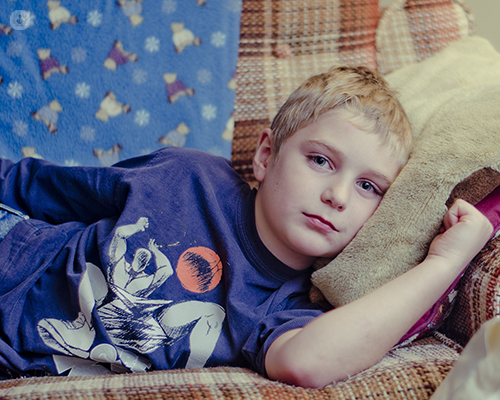Behavioural problems in children: How can I help as a parent?
Escrito por:Behavioural problems can be challenging for both parents and children. Understanding these issues and learning effective management strategies is crucial for fostering a supportive and nurturing environment. In his latest online article, renowned consultant child and adolescent psychiatrist Dr Ben Parker covers common behavioural problems in children and provides practical advice for parents on how to support their child.

Common behavioural problems in children
Attention-deficit/Hyperactivity disorder (ADHD):
- Symptoms include inattention, hyperactivity, and impulsiveness.
- Children with ADHD may struggle with staying focused, following instructions, and completing tasks.
Oppositional defiant disorder (ODD):
- Characterised by a persistent pattern of angry, irritable mood, argumentative behaviour, and defiance.
- Children with ODD often question authority and refuse to comply with rules.
Conduct disorder:
- Involves more severe antisocial behaviour, such as aggression towards people or animals, destruction of property, and deceitfulness.
- Early intervention is crucial to prevent more serious issues later in life.
Anxiety disorders:
- Include excessive fear, worry, and avoidance behaviours.
- Children may experience separation anxiety, social anxiety, or generalised anxiety disorder.
Autism spectrum disorder (ASD):
- A developmental disorder affecting communication and behaviour.
- Children with ASD may have difficulty with social interactions and exhibit repetitive behaviours.
How can parents support their child?
Establish clear expectations and consistency
- Set clear rules: Children need to know what is expected of them. Clearly defined rules help provide structure.
- Be consistent: Consistent enforcement of rules helps children understand the consequences of their actions.
Positive reinforcement
- Reward good behaviour: Praise and rewards can reinforce positive behaviours. Use a system of rewards to encourage desired actions.
- Focus on effort: Acknowledge the effort your child puts into their actions, not just the outcomes.
Effective communication
- Listen actively: Show that you value your child’s thoughts and feelings by listening without interrupting.
- Use positive language: Frame instructions and feedback in a positive manner to encourage cooperation.
Teach problem-solving skills
- Model appropriate behaviour: Demonstrate how to handle conflicts and frustrations calmly.
- Encourage independence: Guide your child through the problem-solving process rather than solving problems for them.
Seek professional help when needed
- Consult a paediatrician or psychiatrist: If your child’s behaviour is severely impacting their daily life, professional advice can be crucial.
- Therapies and Interventions: Behavioural therapy, family therapy, and other interventions can provide targeted support.
Create a supportive environment
- Healthy routines: Maintain a consistent daily routine to provide a sense of security.
- Balanced lifestyle: Ensure your child has a balance of physical activity, sleep, and relaxation.
Educate yourself
- Stay informed: Learn about your child’s specific behavioural issues to understand their needs better.
- Parenting workshops: Participate in workshops and support groups to gain new strategies and support.
Managing behavioural problems in children requires patience, understanding, and a proactive approach. By establishing clear expectations, using positive reinforcement, and seeking professional guidance, when necessary, parents can support their child in developing healthy behaviours. Creating a nurturing and structured environment is essential for helping children thrive.
For more detailed advice and personalised support, consider booking a consultation with renowned consultant child and adolescent psychiatrist Dr Ben Parker vis his Top Doctors profile.


